Africa
Conference Bitcoin Afrique: A Bitcoin-Only Revolution in French-Speaking Africa
Published
1 month agoon
By
admin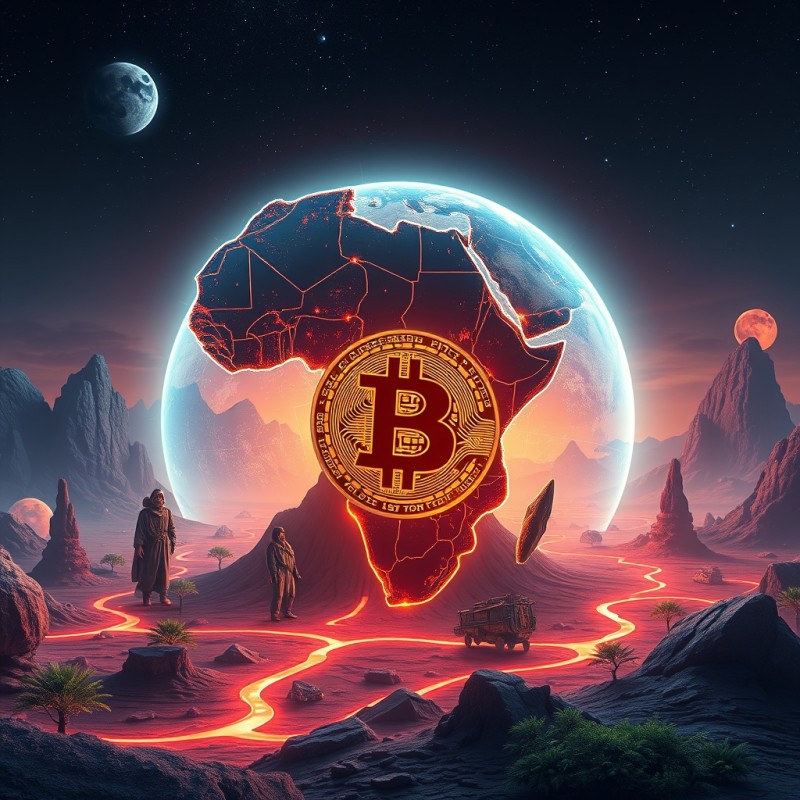

In April 2025, Bitcoiners from across the world will converge in Douala, Cameroon, for the Conference Bitcoin Afrique (CBA), a groundbreaking event dedicated to Bitcoin adoption in French-speaking African countries.
This is not just another crypto or Bitcoin event — it will be a focused, high-impact gathering that aims to educate, empower, and connect the French-speaking Bitcoin community like never before.
With over 400 in-person attendees expected and a digital reach exceeding 50,000 people via social media platforms such as Facebook, X, Youtube, and TikTok, this conference represents a crucial milestone in Bitcoin adoption across French-speaking Africa.
But why is this event French-only and Bitcoin-only? And why is hosting it in Douala, Cameroon, so significant? Let’s explore.
The Franc CFA: A Legacy of Economic Dependence
To understand why Bitcoin adoption is gaining traction in French-speaking Africa, one must first understand the controversial Franc CFA — a colonial-era currency used by 14 African nations and controlled by the French Treasury.
For decades, this system has hindered economic sovereignty, imposed high inflation rates, and restricted monetary policy independence for millions of people.
Unlike Africans living in English-speaking Africa countries, who often enjoy greater monetary autonomy, Africans in French-speaking African nations remain tethered to a financial system that prioritizes stability for France over the economic growth of Africa.
This is where Bitcoin comes in.
Bitcoin offers an alternative: an open, decentralized, and inflation- and censorship-resistant financial system. It empowers individuals to take control of their wealth without having to rely on centralized institutions or foreign influence.
Conference Bitcoin Afrique is dedicated to showcasing how Bitcoin can help break these economic chains.
Why a French-only Bitcoin Conference?
Despite the growing Bitcoin adoption worldwide, French-speaking Africa remains underserved when it comes to Bitcoin conferences.
Most major Bitcoin conferences, educational resources, and businesses are heavily English-centric, leaving millions of French-speaking Africans behind in the global Bitcoin movement.
By making Conference Bitcoin Afrique a French-only conference, we are dismantling the language barrier that has long prevented access to Bitcoin education and networking opportunities. This is not just a regional event—it is a movement to establish French-speaking Africa as a major force in the global Bitcoin economy.
For international businesses and Bitcoin advocates, this is a unique opportunity to engage with an untapped market, create localized solutions, and build relationships with grassroots Bitcoiners driving adoption on the ground.
Why Bitcoin-Only?
Unlike many crypto conferences that mix Bitcoin with thousands of altcoins and blockchain projects, Conference Bitcoin Afrique is Bitcoin-only. Here’s why:
- Bitcoin is the only truly decentralized and censorship-resistant digital asset.
- It has the strongest network security and adoption globally.
- It is the best tool for financial sovereignty in Africa.
- It aligns with long-term wealth preservation, not speculation.
The “crypto” narrative in Africa has often been tainted by scams, Ponzi schemes, and unreliable tokens. Many people have lost money chasing hype, and we believe it’s time to refocus on Bitcoin’s core mission: financial freedom and economic empowerment.
At Conference Bitcoin Afrique, attendees won’t be bombarded with questionable “investment opportunities” or flashy tech gimmicks. Instead, they will gain real insights, practical tools, and networking opportunities that support the real-world adoption of Bitcoin.
It’s worth noting that this is not the first Bitcoin-only conference in the region. In fact, we draw inspiration from several pioneering events:
- Dakar Bitcoin Days in Senegal was the very first Bitcoin conference held in French on the continent, setting a precedent for accessible, localized Bitcoin education.
- Bitcoin Mastermind in Benin, organized by Loic Kassamotto and Alphons Mehoume, and the efforts of Nourou with two editions of Dakar Bitcoin Days have all laid the groundwork for what we aim to build.
- The African Bitcoin Conference also deserves to be mentioned for its significant contributions as an inspiration and benchmark.
With CBA, we are attempting to create a larger Bitcoin educational platform for the region so that we can make our collective voice louder.
Our long-term vision is to bring Conference Bitcoin Afrique to different French-speaking countries in subsequent editions, further expanding the reach and impact of Bitcoin education across Africa.
Why Douala, Cameroon?
Douala is the economic capital of Cameroon, a major trade hub, and one of the most Bitcoin-active cities in the region.
Hosting Conference Bitcoin Afrique in Akwa, the city’s central business district, is strategic for several reasons:
- Accessibility: Douala is well-connected to other African cities and international locations.
- Growing Bitcoin Community: The city has a thriving Bitcoin scene with active P2P trading, businesses accepting Bitcoin, and grassroots education initiatives.
- Strategic Location: Cameroon is at the heart of French-speaking Africa, making it an ideal meeting point for attendees from West and Central Africa.
For global Bitcoin advocates, this is a unique chance to experience firsthand how Bitcoin is transforming everyday life in French-speaking Africa.
Get Involved
Bitcoiners, businesses, and global stakeholders can support this initiative by purchasing tickets or sponsoring the event.
Information about both is available via the conference’s website.
Conclusion: A Call to Action
Conference Bitcoin Afrique is more than just an event — it is a movement. And it aims to liberate French-speaking Africa from financial colonialism, to educate communities on the power of Bitcoin, and to connect international Bitcoiners with a rapidly growing market.
The time to act is now. Join us in Douala from April 25th to 27th, 2025, and be part of history.
This is a guest post by Nzonda Fotsing. Opinions expressed are entirely their own and do not necessarily reflect those of BTC Inc or Bitcoin Magazine.
Source link
You may like


Top 4 Crypto to Buy Now as XRP Price Struggles above $2
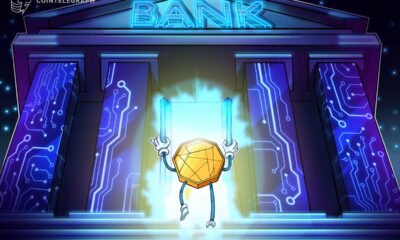

US regulators FDIC and CFTC ease crypto restrictions for banks, derivatives


US Authorities Seize $201,400 Worth of USDT Held in Crypto Wallets Allegedly Intended to Support Hamas


Is Bitcoin’s Bull Market Truly Back?
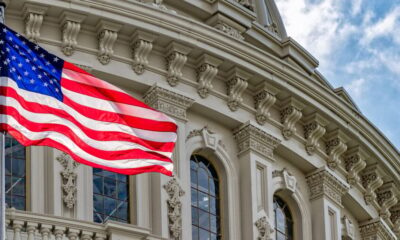

Stablecoin Bills Unfairly Box Out Foreign Issuers Like Tether, Says House Majority Whip


THORChain price prediction | Is THORChain a good investment?
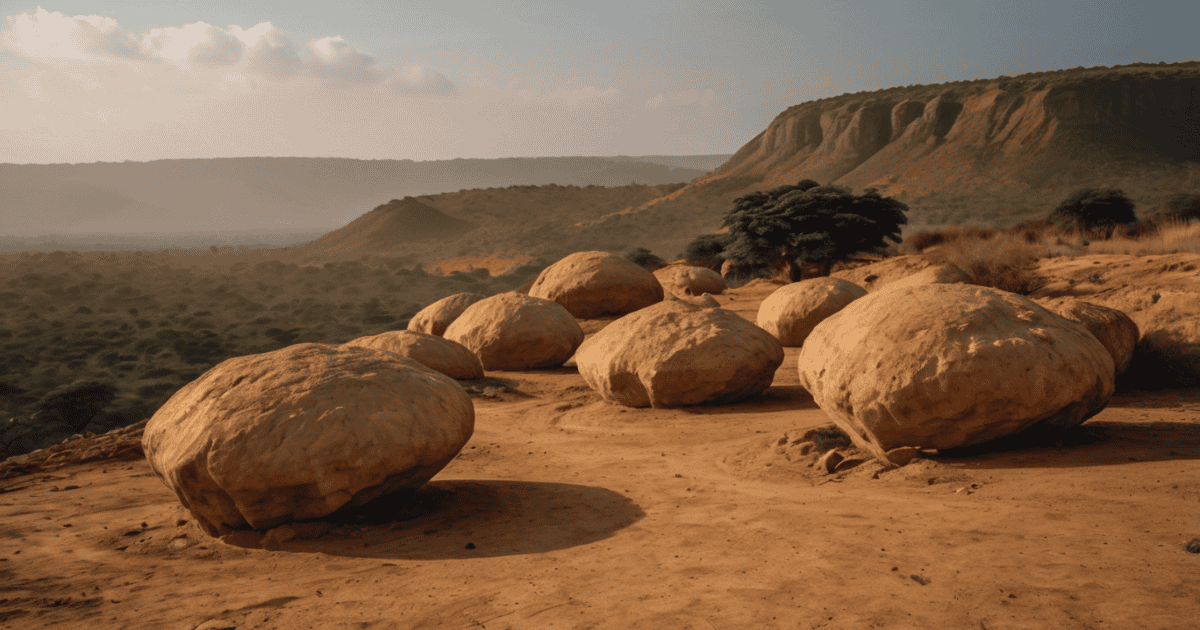
South Africa Reserve Bank(SARB) governor’s question, “Why not strategic beef reserve?” at the 2025 World Economic Forum in Davos may have been rhetorical, but Lesetja Kganyago’s seemingly sarcastic remark about “strategic bitcoin reserves” inadvertently underscored the need for Africa to rethink its economic strategies in the face of global financial shifts. In a world increasingly defined by digital transformation, the concept of money and value storage is evolving rapidly. Africa is no stranger to commodity-based economies. From oil to gold, beef to cocoa, the continent has long relied on natural resources for economic sustenance. However, these commodities are fraught with challenges. Global commodity prices are highly susceptible to market fluctuations, geopolitical tensions, and climate change. For instance, the price of beef can swing dramatically due to disease outbreaks or trade restrictions, just the way the value of fiat currencies swings and remains unpredictable when traded against digital assets like bitcoin due to regional financial policies and currency devaluation. According to the Food and Agriculture Organization (FAO), beef prices have experienced volatility of up to 30% year-over-year due to factors like foot-and-mouth disease and export bans.

Image Source : FAO
Even though Brian Armstrong, CEO of Coinbase, responded to Kganyago’s question with a compelling argument: Bitcoin is not just a better form of money than gold, it is also more portable, divisible, and utility-driven. Over the past decade, Bitcoin has outperformed every major asset class, cementing its position as a superior store of value. For Africa, a continent often marginalized in the global financial system, a Strategic Bitcoin Reserve could be the key to unlocking economic independence, fostering innovation, and securing long-term prosperity. How?
It’s time to be factual and realistic in our comparison. Bitcoin exists digitally and requires no physical storage, commodities like beef and mutton are perishable and costly to maintain. The World Bank estimates that post-harvest losses for agricultural products in Africa amount to $48 billion annually, highlighting the inefficiencies of commodity-based reserves. While commodities have intrinsic value, their utility is restricted to specific industries. Bitcoin, on the other hand, is a global, borderless asset with applications in finance, technology, and beyond while its unique properties make it an ideal candidate for a strategic reserve asset. With a capped supply of 21 million coins, Bitcoin is inherently deflationary, unlike fiat currencies that can be printed indefinitely or beef with endless reproductive mechanisms. According to CoinMarketCap, Bitcoin’s market capitalization has grown from less than 1 billion in 2013 to over 1 trillion in 2025, demonstrating its rapid adoption and value appreciation.
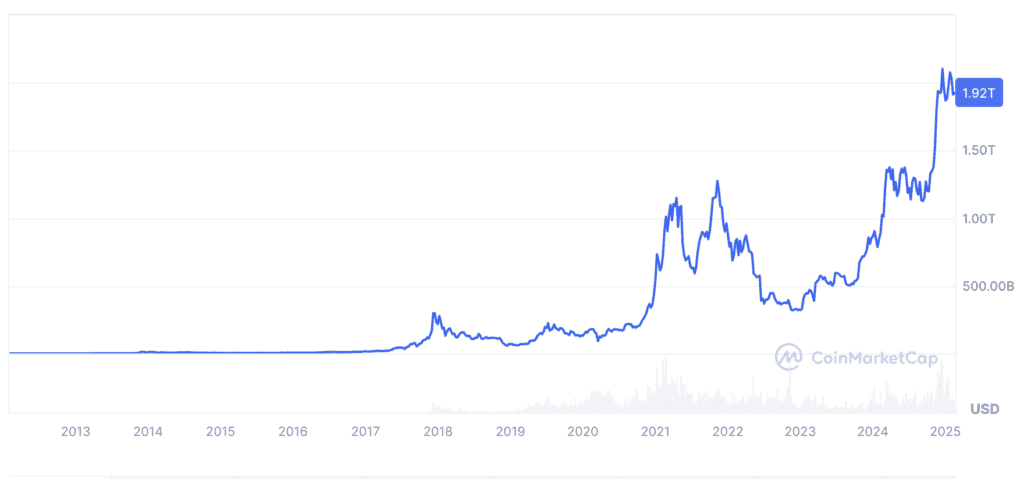
Image Source : CoinMarketCap
WHY BITCOIN OVER BEEF ?
Bitcoin can be transferred across borders in minutes and divided into smaller units (satoshis), making it more practical than gold or beef. Over the past decade, Bitcoin has delivered an average annual return of over 200%, outperforming gold, stocks, and real estate. A study by Fidelity Investments found that Bitcoin’s risk-adjusted returns are superior to traditional assets, making it an attractive option for long-term wealth preservation. Globally, nations are beginning to recognize Bitcoin’s potential as a reserve asset. El Salvador made history in 2021 by adopting Bitcoin as legal tender, while countries like Switzerland and Singapore have integrated Bitcoin into their financial systems. This is 2025 and The United States “Strategic Bitcoin Reserve” Bill is already in the pipeline. According to a 2023 report by Chainalysis, Africa is one of the fastest-growing cryptocurrency markets, with Nigeria, Kenya and South Africa leading in adoption.
Bitcoin’s deflationary nature makes it an effective hedge against inflation, which has plagued many African economies. For example, Nigeria’s inflation rate hit 34.80% in 2024, eroding the value of the Naira. A Bitcoin reserve could protect national wealth from such devaluation. By allocating just 1% of its reserves to Bitcoin, Africa could unlock billions in value. For instance, if the continent’s combined foreign reserves of 500 billion included 5 billion in Bitcoin, a 10x appreciation in Bitcoin’s value would yield $50 billion in returns. Unlike beef production, which contributes to deforestation and greenhouse gas emissions, Bitcoin mining can be powered by renewable energy. According to the Cambridge Bitcoin Electricity Consumption Index, 58.5% of global Bitcoin mining is powered by renewable energy as of 2021. Africa’s vast solar and hydroelectric potential makes it an ideal location for sustainable Bitcoin mining operations. Storing and managing Bitcoin reserves is far more cost-effective than maintaining commodity reserves. There are no storage costs, no risk of spoilage, and no need for complex logistics.
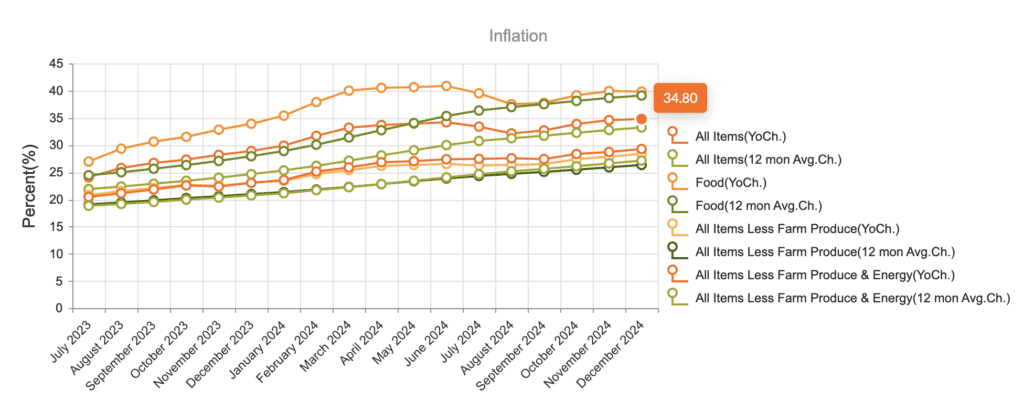
Image Source : Central Bank of Nigeria.
El Salvador’s adoption of Bitcoin as legal tender provides valuable insights for Africa. Despite initial skepticism, Bitcoin has boosted tourism and foreign investment in El Salvador. According to the Central Reserve Bank of El Salvador, tourism revenue increased by 30% in the first year following Bitcoin adoption. Over 70% of Salvadorans previously lacked access to banking services. Bitcoin has enabled millions to participate in the global economy. By reducing reliance on the U.S. dollar, El Salvador has taken a bold step toward financial independence. Many African nations rely heavily on the U.S. dollar for trade and reserves, leaving them vulnerable to external economic policies. Bitcoin offers a decentralized alternative, reducing reliance on traditional financial systems.
By establishing a Strategic Bitcoin Reserve, Africa can secure its economic future, protect its wealth from inflation, and position itself as a global leader in the digital economy. The time has come for Africa to move beyond outdated economic models and embrace the future of money. As Brian Armstrong aptly stated, Bitcoin is not just a better form of money; it is the foundation of a new financial paradigm. For Africa, the choice is clear: Bitcoin, not beef, is the path to prosperity. Bitcoin represents a transformative asset class that offers unparalleled advantages over traditional commodities like beef or mutton.
This is a guest post by Heritage Falodun. Opinions expressed are entirely their own and do not necessarily reflect those of BTC Inc or Bitcoin Magazine.
Source link
Africa
The Bitcoin And Cypherpunk Spirit Is Alive And Well In Africa
Published
2 months agoon
January 30, 2025By
admin

In the past two months, I’ve attended the Adopting Bitcoin Cape Town conference in South Africa and the African Bitcoin Conference in Kenya. I’ve also visited Bitcoin circular economies in both of these countries including Bitcoin Ekasi, Afribit Kibera and Bitcoin Witsand.
These experiences have opened my eyes to the fact that developers, community leaders and everyday plebs across Africa are harnessing the power of Bitcoin to catalyze change in their lives, and they’re doing so while carrying on the spirit of the early cypherpunks.
An African Bitcoiner’s Manifesto
In “A Cypherpunk’s Manifesto,” Eric Hughes wrote:
“Cypherpunks write code. We know that someone has to write software to defend privacy, and since we can’t get privacy unless we all do, we’re going to write it. We publish our code so that our fellow Cypherpunks may practice and play with it. Our code is free for all to use, worldwide. We don’t much care if you don’t approve of the software we write. We know that software can’t be destroyed and that a widely dispersed system can’t be shut down.”
It’s with this attitude that the builders in Africa are building. And while not all of the builders on the continent are writing code, they’re all doing as much of their work as possible without asking permission.
So, based on what I saw in Africa during my recent two trips to the continent as well as to my trip to Ghana in late 2023, during which I attended the African Bitcoin Conference and visited Bitcoin Dua, I’d image an African Bitcoiner’s version of Hughes’ manifesto might read something like this:
“African Bitcoiners just build things with Bitcoin. We know that somebody has to step up to enact change, because all of the promises from the NGOs and governments have fallen short. We publish our proof of work online so that fellow African Bitcoiners can use it as a model and adapt it to their own unique context. Our proof of work and/or code is free to replicate across Africa, and beyond its borders. We aren’t looking for approval from authorities; however, we aren’t opposed to working with them if they see the value in our projects and visions. We know that our work harnesses the immutable and uncensorable nature of Bitcoin as well as the indefatigable nature of the human spirit and, therefore, can’t be stopped or shut down.”
The following are some examples of projects that embody such a spirit:
Bitcoin Ekasi
Bitcoin Ekasi is one of the most shining manifestations of the cypherpunk and Bitcoin ethos in Africa. The project, initiated in 2021 and based in Mossel Bay, South Africa, has become a model for Bitcoin circular economies across Africa.
The project, founded by Hermann Vivier (also one of the organizers for Adopting Bitcoin Cape Town) aimed to do two things: raise funds in bitcoin for The Surfer Kids non-profit, which Vivier also founded, and onboard shops in the community to Bitcoin. (Project Community Leader Luthando Ndabambi has done the latter masterfully over the years.)
The purpose of the second dimension of the mission was to enable community members to spend their bitcoin within the community, ideally raising the economic status of the community as a whole in the process.
The project now works with the local public primary school, which recently began accepting bitcoin for school fees, and has revamped the community centers for both Bitcoin Ekasi and The Surfer Kids (in part thanks to generous donations from Jack Dorsey and fundraising efforts by Aubrey Strobel.)
Unveiling the new sign at the main entrance of the local township primary school!https://t.co/ttBcG7X2nE pic.twitter.com/f6R2ryGC0P
— Bitcoin Ekasi (@BitcoinEkasi) January 17, 2025
Some politicians in the country, several of whom spoke at Adopting Bitcoin Cape Town this year, have taken notice of the project and are as a result starting to see the value of Bitcoin.
Tando
Tando is an app built by a team based in Kenya that lets Bitcoin Lightning wallets interface with Kenya’s mobile money system M-PESA.
The app, which doesn’t require KYC and is highly intuitive, is one of the greatest tools for financial inclusion in the country, as those who lack the proper ID-papers are excluded from making payments via M-PESA. Using Tando, they can make the payment via their Lightning wallet and transact digitally with their fellow Kenyans.
Tando is also a great option for Bitcoiners who visit Kenya. I used it multiple times during my stay in Kenya to pay Kenyan shilling-denominated tabs digitally.
Learn more about the app here.
Bitcoin Dua
Founded in 2023, Bitcoin Dua is located in Agbozume, Ghana, which is near the country’s border with Togo. It’s quickly established itself as one of the fastest-growing Bitcoin circular economies in Africa.
Not only does the project help to educate Ghanaians about Bitcoin, but it also provides coding and robotics classes to help its community members develop skills that can help them find employment that pays in bitcoin.
Lego Robot for preparation towards the 2025 #robotics competition in Ghana. We are able to improve on our equipment acquisition through the #AfricaBitcoinCircularEconomyGrant. Thanks to @Bitcoinbeach and @BitcoinEkasi pic.twitter.com/S6NIQmYqdL
— Bitcoin Dua (@bitcoin_dua) December 29, 2024
The project’s founder, Mawufemor Kofi Folivi and his team were awarded the Social Impact award at this year’s African Bitcoin Conference, and Jack Dorsey has committed funding to help build a sports complex in the community.
The team at Bitcoin Dua can’t stop and won’t stop.
Machankura
Founded in May 2022 by Kgothatso Ngako (KG) (also one of the organizers for Adopting Bitcoin Cape Town), Machankura enables Africans to use bitcoin over Lightning with feature phones (i.e., cell phones before smart phones).
The technology allows users to send bitcoin over USSD, the equivalent of SMS in Africa, giving some of the two-thirds of the population of Africa that doesn’t have access to the internet access to bitcoin.
KG is also currently working on technology that will store the private keys to bitcoin on chips embedded in feature phones, essentially enabling these phones in the six African countries in which the service is available to double as bitcoin hardware wallets.
CYPHERPUNK AF.
Afribit Kibera
Afribit Kibera, located in Kenya, is a Bitcoin circular economy located in the largest informal settlement in Africa.
The project’s co-founder, Ronnie Mdawida, is a long-time human rights advocate and community organizer, and he’s now using Bitcoin as a tool to help further bring the unbanked and the underbanked into the economy.
Mdawida and his team have onboarded 40 merchants to Bitcoin thus far and have set up a recycling program that rewards participants with sats for their work.
Meet our first-ever merchant in 2025—the journey continues! Soon, the entire Kibera will turn orange!@BitcoinEkasi @FBCEglobal @Bitcoinbeach @blinkbtc @geyserfund @thecore21m pic.twitter.com/rWhEzONN4v
— AFRIBIT KIBERA (@AfribitKibera) January 15, 2025
While many of the merchants and community members of Afribit Kibera were introduced to bitcoin primarily as a medium of exchange, many have started saving in it, feeling more hopeful about their future as a result.
Proceeding Together Apace
While each of the projects mentioned above are incredible in their own right, what makes the Bitcoin story in Africa really special is that the members of all these projects continue to learn from and build with one another.
This is the beauty of not only open-source software but also conferences like Adopting Bitcoin Cape Town and the African Bitcoin Conference where builders across the continent share their successes and challenges as well as offer support for each other.
If you’ve yet to attend one of these conferences, I highly recommend you do so, especially if you’d like to feel firsthand the spirit of the cypherpunks or those who embody the Bitcoin ethos.
African Bitcoiners aren’t waiting for permission to change both their lives and the lives of those around them. Bitcoin gives them the opportunity to build a brighter future — together.
Source link
Adoption
Coinbase Rolled Out the Newest State of Crypto Report
Published
2 months agoon
January 24, 2025By
admin
Coinbase rolled out the newest State of Crypto report. The study was conducted by Ipsos. It observes how crypto and blockchain technology are viewed in Argentina, Kenya, the Philippines, and Switzerland and how it impacts the lives of people in these countries.
For most of the part, the study is based on surveys with 4,000 adults (not specifying the age rates) in Argentina, Kenya, the Philippines, and Switzerland conducted on behalf of Coinbase. The choice of countries aims to give an outlook of societies living in markedly different socioeconomic conditions in different parts of the world (none of these countries belong to the same continent, with the Philippines being an archipelago-based country).
The similarities between these countries are the mostly Christian populations and the government systems revolving around the republic model. Nevertheless, the countries have strikingly different areas, positions on the map, historical experiences, cultures, languages, climates, economic states, etc.
Coinbase, however, outlines another similarity between Argentina, Kenya, the Philippines, and Switzerland: according to the exchange team, the residents of these countries feel that the local financial systems need to be improved. More than that, generally, the polled residents see cryptocurrencies and blockchain as tools that may enhance their lives in terms of financial wealth and overall give more freedom and independence.
The state of economy in these countries
The report starts with the statistics demonstrating that in each country, less than a half of all respondents believe that the current financial direction in their country will make them live better than the previous generation. However, even fewer people believe that they will live worse than their parents in Argentina and the Philippines.
So it’s fair to say that in Kenya and Switzerland, people don’t approve of the current financial politics in contrast to the past years, while Argentina and the Philippines rather dislike both the current and the previous efforts, believing that nowadays things are a bit better than before. Respondents in all these countries agree that the local financial system should be changed or overhauled completely. They refer to the financial systems of their countries as “slow,” “expensive,” and “unstable.” They also cited a lack of innovation as one of the problems.
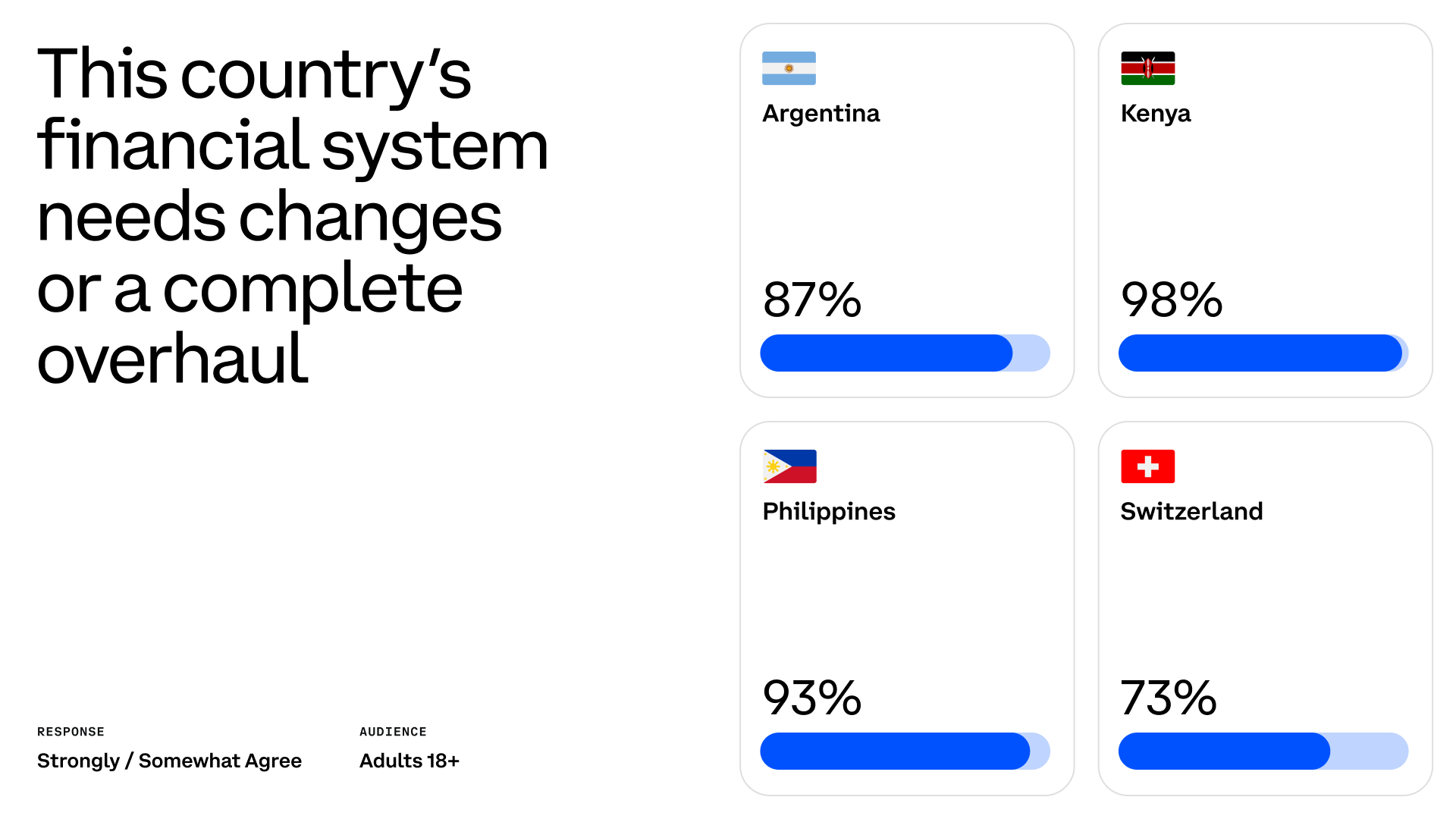
The study reveals four main concerns of the respondents named in the surveys: lack of fairness (discrimination), centralization, decreasing value of the national currency, and too much hard work to earn enough or save money.
The distribution of concerns varies from country to country, with Kenya and the Philippines being most critical towards centralization, discrimination, and wage slavery. Switzerland is least concerned about many of these issues while being cautious towards the government’s dependency on banks. Argentinians have the biggest trust issues with their financial institutions and a problem with saving money.
Crypto as a remedy
Most people polled by Ipsos for the study want to be in charge of their financial state and gain more freedom and control over their money. 7 in 10 respondents see cryptocurrency and blockchain as the way to achieve these goals. More than that, both crypto owners and those who don’t have crypto agree that digital currencies can help them gain more freedom and control over their wealth.
Switzerlanders are markedly less interested in crypto than respondents from other countries. However, over 70% of crypto owners in Switzerland believe that crypto offers them more control and freedom. Less than half of the surveyed Switzerlanders with no crypto believe that they need it.
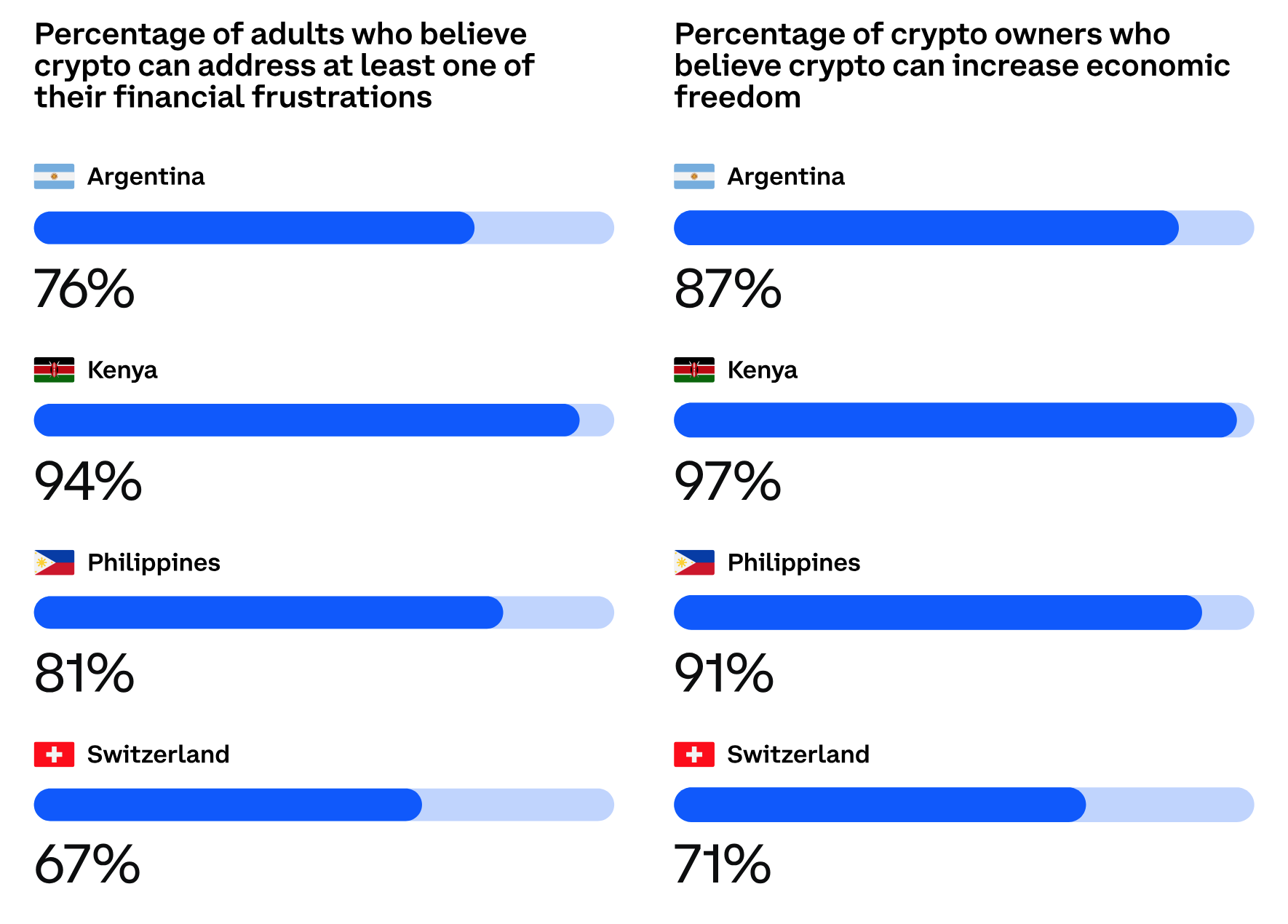
Wider blockchain adoption is also viewed as a favorable factor that may improve the local financial systems and individual wealth. Most respondents believe that blockchain promotes innovation and facilitates control over individual finances. Respondents hope that blockchain will make the system faster and more accessible.
In all polls, Switzerland is presented with lower numbers. It reflects the lower expectations associated with Bitcoin and blockchain and the lower level of dissatisfaction with the financial status quo.
Looking into this study, you may notice a strong connection between the level of satisfaction with the country’s financial direction and the level of support for cryptocurrencies and blockchain. The residents of Switzerland and Argentina are less concerned with the current financial state of their countries, and they are less into crypto than Kenya and the Philippines. Probably, that’s one of the reasons why not only Kenya but Africa in general, where the population has little to no access to banking services but has smartphones, are usually seen as the driver of the mass adoption of cryptocurrency and blockchain-based solutions as the substitute of traditional banks.
Source link
Bitcoin Plunges Below $84K as Crypto Sell-Off Wipes Out Weekly Gains

Top 4 Crypto to Buy Now as XRP Price Struggles above $2
Ethereum Price Hits 300-Week MA For The Second Time Ever, Here’s What Happened In 2022

US regulators FDIC and CFTC ease crypto restrictions for banks, derivatives

US Authorities Seize $201,400 Worth of USDT Held in Crypto Wallets Allegedly Intended to Support Hamas

Is Bitcoin’s Bull Market Truly Back?

Stablecoin Bills Unfairly Box Out Foreign Issuers Like Tether, Says House Majority Whip

THORChain price prediction | Is THORChain a good investment?

Strategy (MSTR) Holders Might be at Risk From Michael Saylor’s Financial Wizardry

3 Altcoins to Sell Before March 31 to Prepare for Crypto Bull Market

A Big Idea Whose Time Has Finally Come

XRP price may drop another 40% as Trump tariffs spook risk traders

Trader Says Ethereum-Based Altcoin Primed for 240%+ Rally if Major Resistance Level Breaks, Updates XRP Outlook

Congressman Ro Khanna Says Democrats Are Changing Their Tune On Bitcoin

France’s Public Investment Bank Bpifrance to Invest $27 Million in Crypto

Arthur Hayes, Murad’s Prediction For Meme Coins, AI & DeFi Coins For 2025

Expert Sees Bitcoin Dipping To $50K While Bullish Signs Persist

Aptos Leverages Chainlink To Enhance Scalability and Data Access

Bitcoin Could Rally to $80,000 on the Eve of US Elections

Sonic Now ‘Golden Standard’ of Layer-2s After Scaling Transactions to 16,000+ per Second, Says Andre Cronje

Institutional Investors Go All In on Crypto as 57% Plan to Boost Allocations as Bull Run Heats Up, Sygnum Survey Reveals

Crypto’s Big Trump Gamble Is Risky

Ripple-SEC Case Ends, But These 3 Rivals Could Jump 500x

Has The Bitcoin Price Already Peaked?

A16z-backed Espresso announces mainnet launch of core product

Xmas Altcoin Rally Insights by BNM Agent I

Blockchain groups challenge new broker reporting rule

Trump’s Coin Is About As Revolutionary As OneCoin

The Future of Bitcoin: Scaling, Institutional Adoption, and Strategic Reserves with Rich Rines

Is $200,000 a Realistic Bitcoin Price Target for This Cycle?
Trending

 24/7 Cryptocurrency News5 months ago
24/7 Cryptocurrency News5 months agoArthur Hayes, Murad’s Prediction For Meme Coins, AI & DeFi Coins For 2025

 Bitcoin2 months ago
Bitcoin2 months agoExpert Sees Bitcoin Dipping To $50K While Bullish Signs Persist

 24/7 Cryptocurrency News3 months ago
24/7 Cryptocurrency News3 months agoAptos Leverages Chainlink To Enhance Scalability and Data Access

 Bitcoin5 months ago
Bitcoin5 months agoBitcoin Could Rally to $80,000 on the Eve of US Elections

 Altcoins2 months ago
Altcoins2 months agoSonic Now ‘Golden Standard’ of Layer-2s After Scaling Transactions to 16,000+ per Second, Says Andre Cronje

 Bitcoin4 months ago
Bitcoin4 months agoInstitutional Investors Go All In on Crypto as 57% Plan to Boost Allocations as Bull Run Heats Up, Sygnum Survey Reveals

 Opinion5 months ago
Opinion5 months agoCrypto’s Big Trump Gamble Is Risky

 Price analysis5 months ago
Price analysis5 months agoRipple-SEC Case Ends, But These 3 Rivals Could Jump 500x


